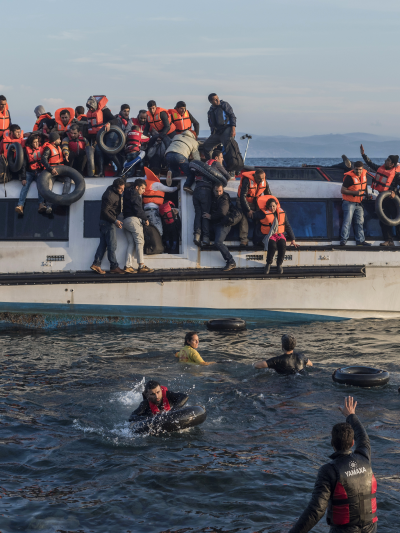In a world facing unprecedented global migration challenges, non-governmental organizations have played a crucial role in saving lives at sea through search and rescue operations. However, a recent development in Italian legislation, coupled with practices by Italian authorities, have raised concerns about the effectiveness of these humanitarian efforts.
Médecins Sans Frontières (MSF, Doctors Without Borders), along with other non-governmental organizations (NGOs), have submitted a formal complaint to the European Commission (EC) to address these issues and to ensure the continued preservation of human life on the world's deadliest migratory route — the Central Mediterranean.
This complaint comes as a crucial call for action in the context of rising challenges faced by humanitarian organizations in the Central Mediterranean. The provisions outlined in Italian Law 15/2023, in conjunction with the pattern of assigning distant ports, impose severe and unwarranted conditions that significantly impede search and rescue (SAR) operations conducted by NGO vessels in the Central Mediterranean.
The measures introduced in this legal framework reflect the larger backdrop of inadequate proactive state-led SAR initiatives in the region, which has left NGOs to fill the void and prevent avoidable loss of life at sea. The gravity of the situation cannot be ignored as the Central Mediterranean has witnessed a staggering loss of life in the first half of 2023, with a reported 1,750 individuals either dead or missing, cementing its status as the deadliest migratory route globally.
Violation of International and EU Law
The crux of the complaint is centered around the argument that Law 15/2023 and the practice of assigning distant ports for disembarkation infringe upon the provisions of various EU legal instruments and pertinent international laws including norms protecting human rights, the freedom of association for SAR NGOs, and maritime laws such as International Convention for the Safety of Life at Sea (SOLAS) and SAR conventions.
Firstly, the complaint highlights that Law 15/2023 and the Italian authorities' actions violate norms safeguarding the human and fundamental rights of individuals rescued at sea. These protections are enshrined in the Treaty of the European Union (TEU), the Treaty on the Functioning of the European Union (TFEU), the Charter of Fundamental Rights of the European Union (CFR), and the European Convention on Human Rights (ECHR).
Secondly, the complaint stresses that SAR NGOs' freedom of association, a fundamental right, is being compromised by the actions of the Italian authorities. The right to freedom of association is being interfered with, impeding NGOs' legitimate activities and their role in maritime rescue operations.
Thirdly, the complaint asserts that Law 15/2023 and distant port assignments contradict international, conventional, and customary maritime law. The International Convention for the Safety of Life at Sea (SOLAS), the International Convention on Maritime Search and Rescue (SAR), and relevant International Maritime Organization (IMO) Resolutions, are all cited to highlight the violations.
A Plea for Reason and Humanity
MSF's complaint is grounded in a series of compelling arguments and meticulously referenced legal frameworks. The organization contends that the Italian law and practices are unjustifiably restrictive and hamper the lifesaving work of SAR NGOs. Key points raised in the complaint are the following:
- Law 15/2023 mandates the collection of specific survivor data by the crew of rescue vessels, a requirement that contradicts EU Directive 2013/32 on procedures for granting international protection, and places undue burdens on rescue operations. The law's vague requirement for information provision to competent authorities, coupled with penalties for non-compliance, leads to excessive, unrelated, and unpredictable information requests, burdening SAR NGOs.
- The law mandates rescue vessels to reach assigned ports "without delay," hindering effective SAR activities, including patrolling and responding to distress calls after a rescue operation. The complaint mentions that NGO vessels have faced repeated inspections and administrative detentions, contrary to international and European laws on port state control.
- The Italian authorities' practice of assigning distant ports from the rescue region goes against international law and EU Regulation no. 656/2014, which outlines the concept of a "place of safety." According to this regulation, rescue operations are considered concluded when survivors have been delivered to a place of safety. States must coordinate and cooperate in rescue operations so that survivors can be delivered to a place of safety as soon as reasonably possible. Italy’s practice is in violation of this, considering that it unreasonably prolongs the stay of the survivors on board the rescue vessel. Therefore, it jeopardizes the health and wellbeing of extremely vulnerable individuals, whilst imposing undue delay and financial burden on rescue vessels.
A Call to Preserve Human Life
MSF calls on the European Commission to scrutinize Italian Law 15/2023 and associated practices to ensure that the rights of survivors, the effectiveness of SAR operations, and the humanitarian principles that underpin these efforts are upheld. The complaint underscores the importance of collaborative efforts among states, NGOs, and international bodies to safeguard human life and dignity in the face of the Central Mediterranean crisis.
At its core, MSF's complaint stands as a powerful assertion of humanitarian values and a plea to prioritize the preservation of human life above administrative hurdles and political considerations. As this complaint reverberates through the halls of legal discourse, it serves as a stark reminder that the pursuit of justice transcends borders, demanding immediate attention and action to mend a broken system.
Sources
[1] Medecins sans frontiers (2023). MSF files complaint to European Commission on search and rescue law. Obtained from: https://www.msf.org/msf-files-complaint-european-commission-search-and-rescue-law
[2] Aljazeera (2023). Italy detains two NGO vessels for defying new migrant rescue law. Obtained from: https://www.aljazeera.com/news/2023/6/3/italy-detains-two-ngo-vessels-for-defying-new-rescue-law
[3] Euronews (2023). 'It's a shame': NGOs blast Italy's compulsory code of conduct for rescue ships in the Mediterranean. Obtained from: https://www.euronews.com/my-europe/2023/02/06/its-a-shame-ngos-blast-italys-compulsory-code-of-conduct-for-rescue-ships-in-the-mediterra
Photograph
NGOs Search and Rescue Operations are negatively affected by Italian law. 20151030 Syrians and Iraq refugees arrive at Skala Sykamias Lesvos Greece 2, author: Ggia, 30 October 2015, source: Wikimedia Commons, CC BY-SA 4.0., edits: cropped.

